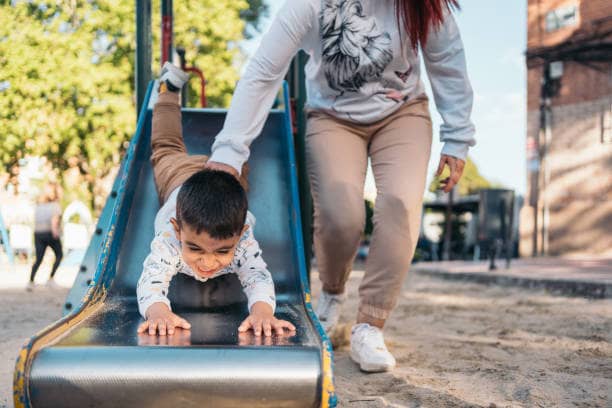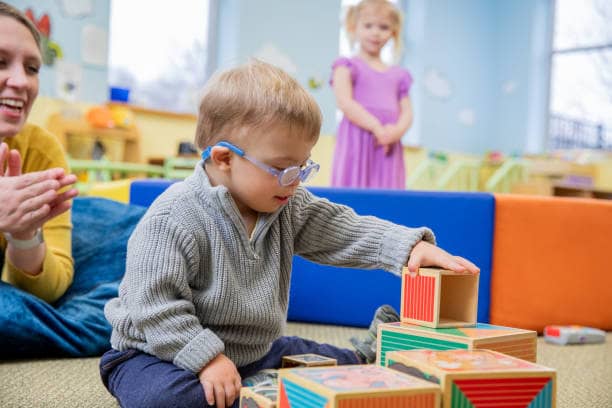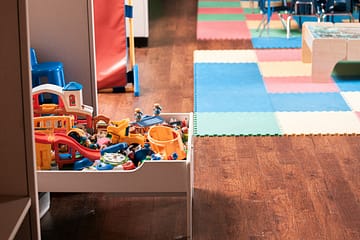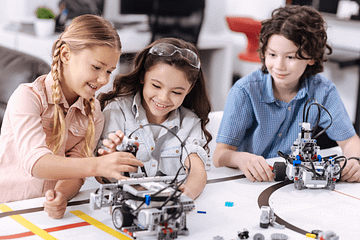
Every day, as a parent, you get to see your child’s world-discovery. Children make their own types of play. They explore, create, knock down, taste, and touch everything out of an unfettered curiosity. Their bodies and minds develop in amazing ways while kids play. Children who are neurodiverse can develop their motor skills, creativity, emotional intelligence, and decision-making abilities through play. They learn persistence, problem-solving techniques, and social abilities through play. Giving them lots of chances to play helps their brain form important neural connections. Playtime without rules is also a stress reliever and happiness booster. One of the most crucial things you can do to promote their growth and development is to give them the opportunity to play.
Play activities stimulate a child’s thinking and aid in the development of neural pathways. As kids make up their own games and conceive various scenarios, play also fosters creativity. Children learn how to collaborate, communicate, and appreciate diverse viewpoints when they play with other people. For neurodiverse kids who might have trouble with communication and emotional regulation, board games and sports offer opportunities to win and lose with grace, facilitating important social interactions. Play is essential to a child’s healthy growth. Their bodies and minds are stimulated, and they acquire lifelong social, emotional, and cognitive skills. Children who play also find it easier to cope with difficult emotions and situations in a fun, imaginative way.
How Play Benefits Children’s Brains
All children need to play, but children with neurodiverse traits need to play even more. Play benefits their cognitive and motor development in a variety of ways. It enhances children’s ability to solve problems by pushing them to attempt novel approaches and think creatively. Solving puzzles can be difficult for youngsters with neurodiverse traits, therefore, unstructured play is essential. To help develop these skills in an enjoyable way, provide toys like puzzles, board games, Legos, and construction blocks. Playdates and social interactions with other kids give neurodiverse kids a chance to practice social skills. Since neurodiverse kids frequently have difficulties in these areas, play therapy and play directed by the child can be highly beneficial. Give children things that promote pretend and creative play. Play can help children who are neurodiverse, such as those with autism or ADHD. It enhances interpersonal abilities like sharing, taking shifts, and collaborating with others. Additionally, play improves motor abilities, spatial awareness, and mental flexibility. Specifically, imaginative play aids in children’s comprehension of various viewpoints and their ability to read social cues.
Types of Play Critical for Growth
One of the most crucial things you can do to support your child in realising their full potential is to give them opportunity to play. Though there are many different kinds of play, three of the most important ones for a child’s healthy development are sensory, physical, and creative play. Playing physically, such as running, leaping, climbing, and riding bikes or scooters, gives kids a chance to get exercise and improves their hand-eye coordination and motor abilities.
Providing your kids lots of playtime each day will promote healthy growth and help them reach their full potential in a lot of ways. To make sure they receive the advantages of each, it will be important to keep a close eye on the kinds of play they participate in and to make adjustments to offer balanced chances. Go ahead and play!
Making Playtime Fun for Children
Children who are neurodiverse frequently have needs and interests that are distinct from those of neurotypical children. It’s critical for parents to recognise their child’s special talents and difficulties so they can be supported through play. Play is essential for growth, learning, and development at any age, but it’s especially important for kids. Some kids with neurodiverse traits may find unstructured playtime too demanding. Establish time limitations, offer particular toy alternatives, or recommend an initial activity to establish some structure. Playtime might become less regulated as your child grows more at ease. When your child starts to ask for more options or needs less guidance, these are signs that they are ready for greater independence. For instance, get various sized and shaped building blocks for your child if they enjoy creating with them. Your child will find playtime more interesting and enjoyable if you give them the freedom to choose the games and activities they want to do. Interactive play with parents and caregivers is beneficial for children who are neurodiverse.
What types of play are most helpful?
Imaginative play, sensory play, rough-and-tumble play, board games and puzzles, and outdoor play are the finest forms of play for growth. Playful physical activities like wrestling, tumbling, and climbing are all part of rough-and-tumble play, which improves coordination, balance, and strength. Playing outside in public areas offers chances for physical activity, sociability, and reconnection with the natural world. Sunlight and fresh air are also beneficial to the body physiologically. As much as possible, playtime should be unstructured, kid-led, and open-ended. While some supervision is necessary during play, excessive parental control or direction can counteract play’s developmental advantages. Achieving the ideal mix between support and independence is crucial.



